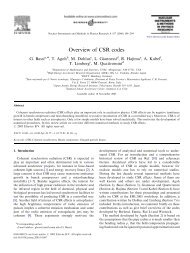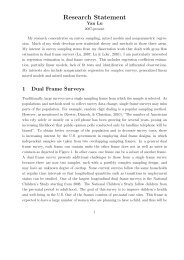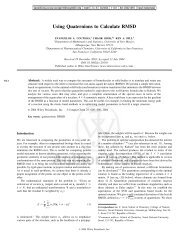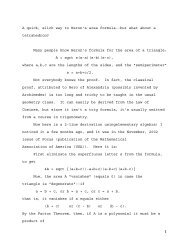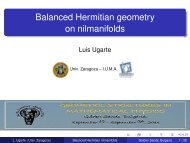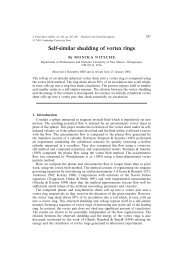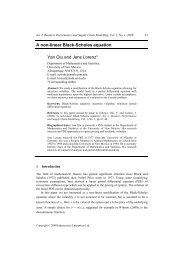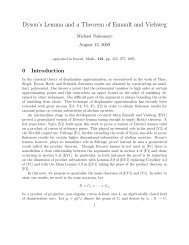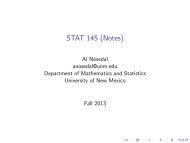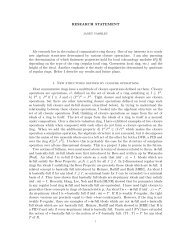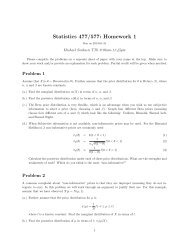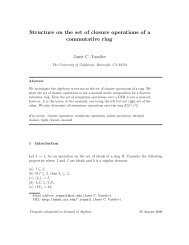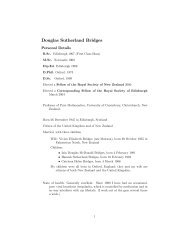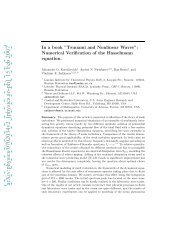OEO Office of Equal Opportunity - Department of Mathematics and ...
OEO Office of Equal Opportunity - Department of Mathematics and ...
OEO Office of Equal Opportunity - Department of Mathematics and ...
You also want an ePaper? Increase the reach of your titles
YUMPU automatically turns print PDFs into web optimized ePapers that Google loves.
292 ARTS AND SCIENCES<br />
María Dolores Gonzales, Ph.D., University <strong>of</strong> New Mexico,<br />
Spanish<br />
Eleuterio Santiago-Díaz, Ph.D., Brown University—Hispanic<br />
Studies<br />
Catherine Travis, Ph.D., La Trobe University—Linguistics<br />
Director Language Learning Center<br />
Neddy Vigil, Ph.D., The University <strong>of</strong> New Mexico—Spanish<br />
Pr<strong>of</strong>essors Emeriti<br />
John J. Bergen, Ph.D., University <strong>of</strong> California<br />
(Los Angeles)—Spanish<br />
Garl<strong>and</strong> D. Bills, Ph.D., University <strong>of</strong> Texas—Spanish<br />
Ruben Cobos, Ph.D., The University <strong>of</strong> New Mexico—<br />
Spanish<br />
Pelayo Fernández, Ph.D., Salamanca University—Spanish<br />
Rosa Fernández, Ph.D., The University <strong>of</strong> New Mexico—<br />
Spanish<br />
Dick Gerdes, Ph.D., University <strong>of</strong> Kansas—Spanish<br />
Angel González, M.A., Universidad de Oviedo—Spanish<br />
Erlinda Gonzales-Berry, Ph.D., The University <strong>of</strong><br />
New Mexico—Spanish<br />
Tamara Holzapfel, Ph.D., University <strong>of</strong> Iowa—Spanish<br />
Raymond MacCurdy, Ph.D., University <strong>of</strong> North Carolina—<br />
Romance Languages<br />
Alfred Rodríguez, Ph.D., Brown University—Spanish<br />
Jon M. Tolman, Ph.D., The University <strong>of</strong> New Mexico—<br />
Portuguese<br />
Introduction<br />
The mission <strong>of</strong> the <strong>Department</strong> <strong>of</strong> Spanish <strong>and</strong> Portuguese<br />
is to promote quality teaching <strong>and</strong> research that integrate the<br />
languages, literatures, linguistics <strong>and</strong> cultures <strong>of</strong> the Spanish<strong>and</strong><br />
Portuguese-speaking worlds. We share our expertise<br />
with the university community, the city <strong>of</strong> Albuquerque <strong>and</strong> the<br />
state <strong>of</strong> New Mexico. We are especially committed to revitalizing<br />
the Spanish language in New Mexico <strong>and</strong> to studying<br />
the interactions between cultures in the Southwest.<br />
Faculty <strong>and</strong> students work together in the classroom, in the<br />
community, <strong>and</strong> in study abroad to develop underst<strong>and</strong>ing,<br />
sensitive communication <strong>and</strong> critical thinking about our diverse<br />
<strong>and</strong> interconnected world. The <strong>Department</strong> prepares its students<br />
with the skills, knowledge, <strong>and</strong> values necessary to lead<br />
productive <strong>and</strong> fulfilling lives as citizens <strong>and</strong> life-long learners.<br />
Group Requirements<br />
Literature courses in translation are not accepted for fulfillment<br />
<strong>of</strong> foreign language group requirements.<br />
Language Learning Center<br />
Work in the Language Learning Center is assigned in connection<br />
with the lower-division language courses <strong>and</strong> does<br />
not carry extra credit.<br />
Spanish Language Instruction<br />
Program<br />
Language instruction courses develop grammar, vocabulary,<br />
the four language skills—listening, speaking, reading <strong>and</strong><br />
writing—<strong>and</strong> culture.<br />
Sabine Ulibarrί Spanish as a Heritage<br />
Language (SHL) Program<br />
Spanish courses 111, 112, 211, 212 are reserved for students<br />
who grew up in a Spanish-speaking environment. The objective<br />
<strong>of</strong> these classes is to build upon the language base which<br />
the students already possess. All four language skills—listening,<br />
speaking, reading <strong>and</strong> writing—are stressed, but time<br />
is not spent drilling aspects with which students are already<br />
familiar. All students who speak or underst<strong>and</strong> some Spanish<br />
as a result <strong>of</strong> having heard it at home or from gr<strong>and</strong>parents<br />
are urged to enroll in these classes. A placement evaluation<br />
is required before entering these classes. (See <strong>Department</strong><br />
for times <strong>and</strong> dates.)<br />
Spanish as a Second Language (SSL)<br />
Program<br />
This program is designed for students <strong>of</strong> Spanish whose<br />
native home language is not Spanish.<br />
Required Placement Evaluation<br />
All University <strong>of</strong> New Mexico all students who choose<br />
Spanish to fulfill their language requirement are required<br />
to take the Spanish Placement Evaluation for placement in<br />
the appropriate level. This evaluation is administered in the<br />
Language Learning Center located in 124 Ortega Hall.<br />
To Challenge a Course<br />
If you place into a higher-level Spanish course, you not only<br />
advance faster, but also have the option to challenge the<br />
lower-level Spanish course(s) for graduation credit (challenging<br />
means you earn credit—grade <strong>of</strong> B or better—at a higher<br />
level <strong>and</strong>, upon paying regular tuition for lower level courses,<br />
may receive credit for them). You can also test out <strong>of</strong> a Spanish<br />
class <strong>and</strong> earn credit by taking the Spanish CLEP test (check<br />
the Web site http://www.unm.edu/~testctr/clep.htm for information<br />
on CLEP testing).<br />
Undergraduate Programs<br />
Spanish Undergraduate Advisor<br />
Anthony J. Cardenas, (505) 277-5526, ajcard@unm.edu<br />
Portuguese Advisor<br />
Margo Milleret, (505) 277-8613, milleret@unm.edu<br />
Major Study Requirements<br />
Spanish<br />
Thirty hours in Spanish courses numbered 300 or above.<br />
Required courses: a) 301; b) 302; c) 307; d) 352; e) one <strong>of</strong> the<br />
following: 350, 351, 353; f) one <strong>of</strong> the following: 411 or 412;<br />
g) one <strong>of</strong> the following: 431 or 432; <strong>and</strong> h) at least 9 additional<br />
hours above 300, 3 <strong>of</strong> which must be at the 400 level.<br />
Spanish 301 may be repeated for credit as topic changes;<br />
however, only 3 hours <strong>of</strong> 301 are applicable toward the major.<br />
A student may follow a general course <strong>of</strong> studies or a group <strong>of</strong><br />
courses in the following areas: Spanish Peninsular Literature,<br />
Spanish American Literature, Southwest Hispanic Studies<br />
or Linguistics. In addition, work in another foreign language<br />
at the 202 or 276 level (or equivalent) must be completed.<br />
Students planning to major in Spanish should consult with<br />
the <strong>Department</strong> undergraduate advisor. All grades must be<br />
C or better. Majors also prepare a portfolio, see department<br />
for details.<br />
Portuguese<br />
Thirty hours in Portuguese courses numbered 200 or above.<br />
Required courses: 275–276, 311–312, 415–416, plus 6<br />
additional hours at the 400 level. Work in another foreign<br />
language at the 202–276 level (or equivalent) must also be<br />
completed. Students planning to major in Portuguese should<br />
consult with the <strong>Department</strong> undergraduate advisor.<br />
UNM CATALOG 2006–2007 Symbols, page 611.



